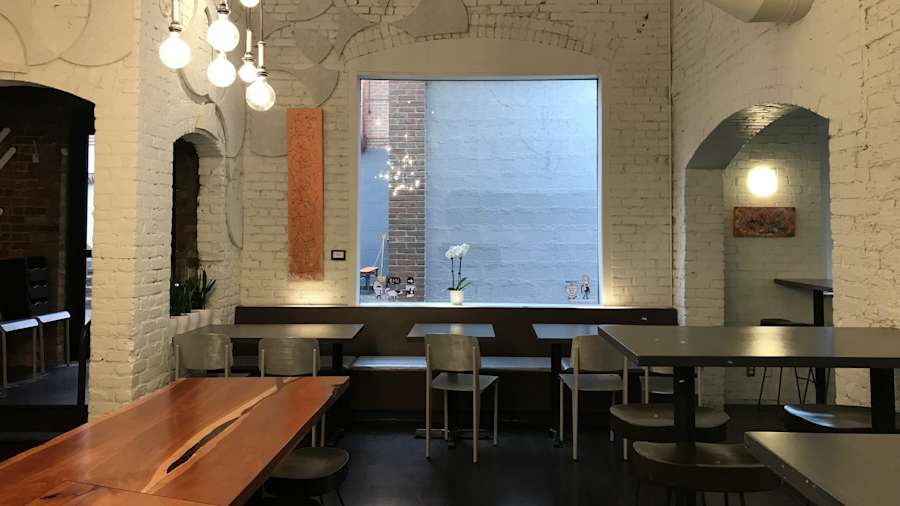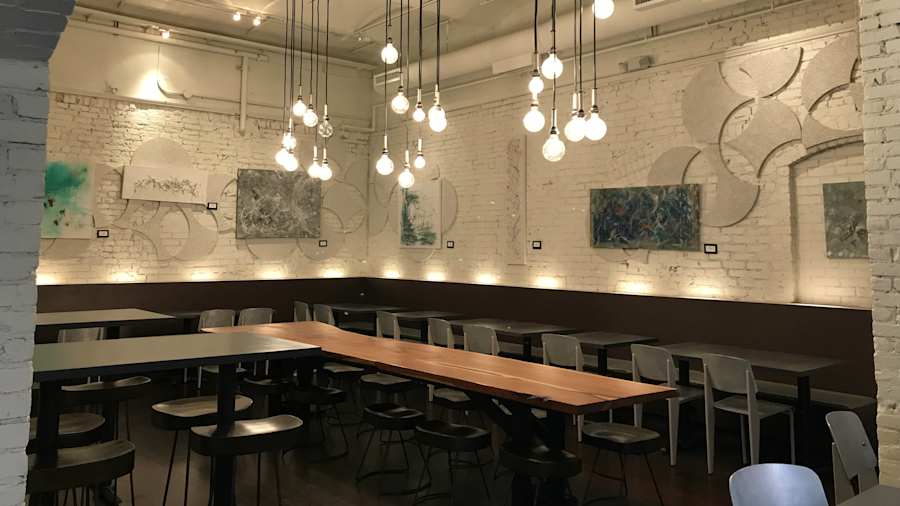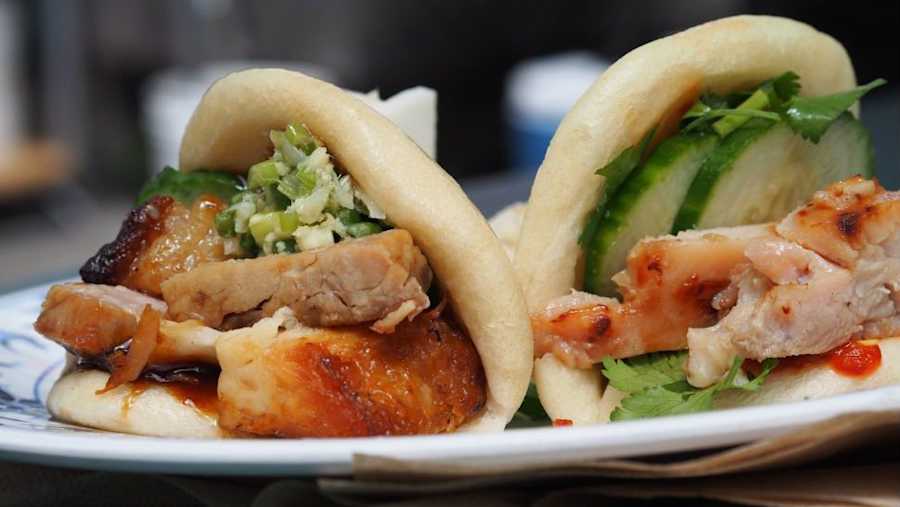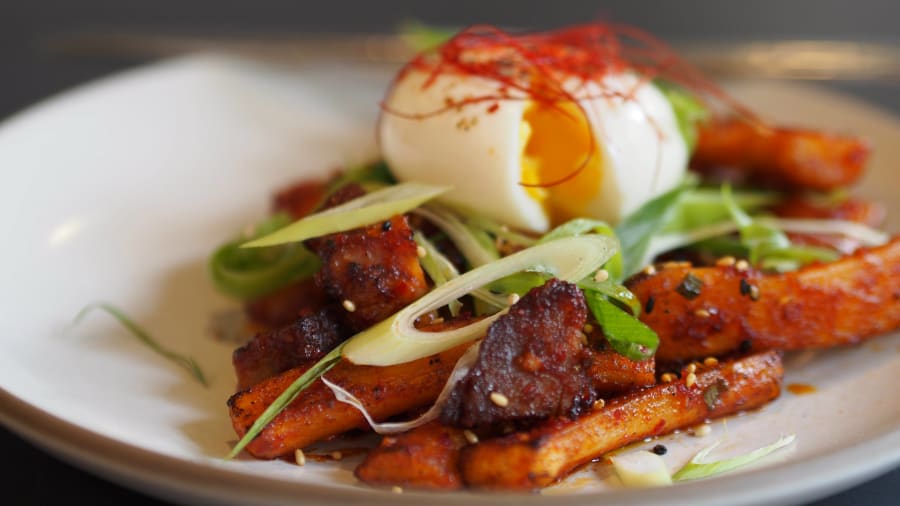ANN ARBOR – University of Michigan grad Ji Hye Kim never imagined she would go into the restaurant business.
The Korean native moved to the United States when she was 13. After studying political science and economics in Ann Arbor, she returned to her family's home state of New Jersey and began a career in insurance and human resources consulting in the medical field.
Recommended Videos
Her boyfriend, now husband, was working at University of Michigan, and after they got married she decided to move back to Tree Town.
"That was the first time in my life since I became an adult where I was like, 'Now I get to ask myself what I want to do instead of what I have to do.'"
After attending several events at the architecture school where her husband works, she admitted she was bored by the conversations but became a big fan of the food that was always catered by Zingerman's Delicatessen.
"One day I walk into Zingerman’s Deli -- and I’m usually not a chatty shopper and I’m pretty introverted -- but I ended up having a great time talking to the cheese person and I got intrigued about this company and this staff that got me out of my shell," said Kim.

The decor at Miss Kim is simple and modern, with local art for purchase on the walls (Photo: Meredith Bruckner)
She applied for positions at the Deli and the Bakehouse where she was rejected, "because I'm not a baker (laughs)."
"I got a job at the delicatessen and that was very serendipitous because the retail department would’ve been the best department for me -- and that’s where I ended up -- because you learn a lot about food and the relationships between the growers, the producers and artisans," Kim said. "I ended up, without really knowing, in a perfect place."
After working a slow-paced job at the Deli, Kim was ready to take on something more.
She, along with another employee whose mother is Taiwanese, approached Zingerman's founders Paul Saginaw and Ari Weinzweig with a vision (Zingerman's lingo for a 'grand' business plan) and began the Path to Partnership.
"At Zingerman’s, anybody can get on the path to become a partner at an existing business or create a brand new business," explained Kim.
But, being experienced with running operations at a company, Kim and her partner decided to try running a food truck before running a full-fledged restaurant.
"We thought that would be a great way to run a business without a storefront, which is a lot of investment," she explained. "So we got the food cart, and around that time, Mark Hodesh from Downtown Home & Garden, converted his parking lot into Mark’s Carts. It was an exciting time for me because there were so many young people trying to do a great thing, serving really great food and that’s how we joined Mark’s Carts from the first season."

The main dining room (Photo: Meredith Bruckner)
After the first season, her partner decided it wasn't for her. Kim ran a food truck there for four seasons, and during the offseason, she got more experience cooking food in the Zingerman's Deli kitchen and at the Roadhouse.
As fate would have it, just as her application to partnership was about to be approved, her husband won a fellowship to study in Rome for one year.
Kim decided that if she were to join him, she had to connect to the food industry there, and became involved with the Rome Sustainable Food Project.
"It had a big impact on me because the simplicity of Italian food reminded me a lot of the simplicity of Korean food," she said.
Upon her return, the space where her restaurant is located became available.
So what can customers expect at Miss Kim?
"We try to keep true to our food cart roots," she explained. "We keep it pretty casual. The cart was more like pan-Asian casual grab-and-go lunch food. We kept that identity for lunch. So then we do an irreverent version of banh mi. We have rice bowls, which are a lot more popular and we kept the buns."

Roasted pork belly steamed buns (Photo: Miss Kim Ann Arbor)
The counter service lunch is notably different from dinner, which is full-service.
As for the food, Kim has taken a keen interest in the development of Korean recipes throughout history.
"I do a lot of research into historical food," she said. "I started collecting the republished versions of cook books from the 14th, 15th, 16th, 17th and 18th centuries. And I read them and try to imagine the whole story of Korean food because if you didn’t delve into that, you wouldn’t know that kimchi didn’t always have chili flakes in them. That was only until 200 years ago."
Through her research, all in Korean, Kim has been able to discover surprising flavors and shifts throughout the centuries.
"A lot of Korean people don’t like cilantro -- they think it’s exclusively Mexican or southeast Asian. But there is a town that uses a lot of cilantro. People (also) say Korean people don’t eat cheese, but I found a ricotta recipe from the 14th century. So it kind of breaks your stereotypical ideas just based on your personal experience -- that has been very liberating."
As for authenticity, Kim remains as authentic as she can when crafting dishes on the menu, and she says the basis for this is honoring each of the country's eight regions (before North and South split).
"Korea is not a big country but it’s very varied geographically," she said. "'It’s a peninsula so it’s surrounded on three sides with ocean, but 70% of the land is mountainous. Depending on where you are, you get access to very different food sources, so then you get very different regional food. In the southern part of Korea, the seasoning is a bit saltier and the food is a bit spicier.

(Photo: Miss Kim Ann Arbor)
"The more north you go, it’s more subtle and simple. If you’re by the seaside, you use more seafood. If you’re by the mountainside you do more foraging. So I see a lot of diversity in Korean food, whereas I don’t see diversity in Korean food in America unless you go to a major city -- the restaurant menus tend to be very similar."
Another aspect of Korean food that she tries to emulate, besides its regional specialties -- is that it's seasonal.
"That means you have to be in touch with where you are and that’s where Michigan comes in," she said. "That’s why we try to use as much seasonal and regional local food as possible. We have really good relationships with a lot of farmers at the Ann Arbor Farmers Market. We’ve hosted farm dinners where we introduce two farmers with whom we work closely together. One is We the People Growers Association – we love Melvin Parson’s mission and we buy from him. We work with Ann Arbor Seed Co. We work with a lot of local farms."
Read our interview with Melvin Parson here.
Miss Kim is hosting a Buddhist Vegan Dinner in honor of the Buddha's birthday using local seasonal produce on May 21 at 6:30 p.m.
Explore the restaurant's lunch and dinner menus here.
For more information and to learn more about the restaurant's story, visit its website.



